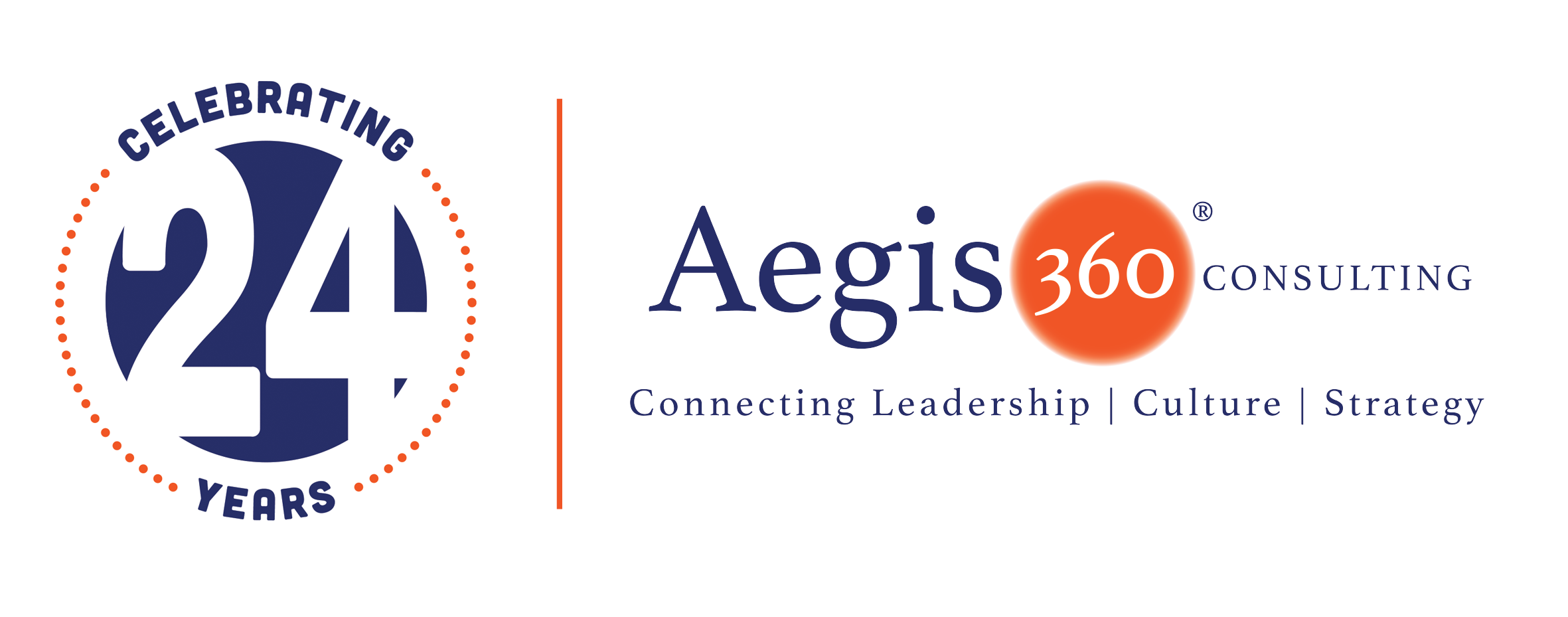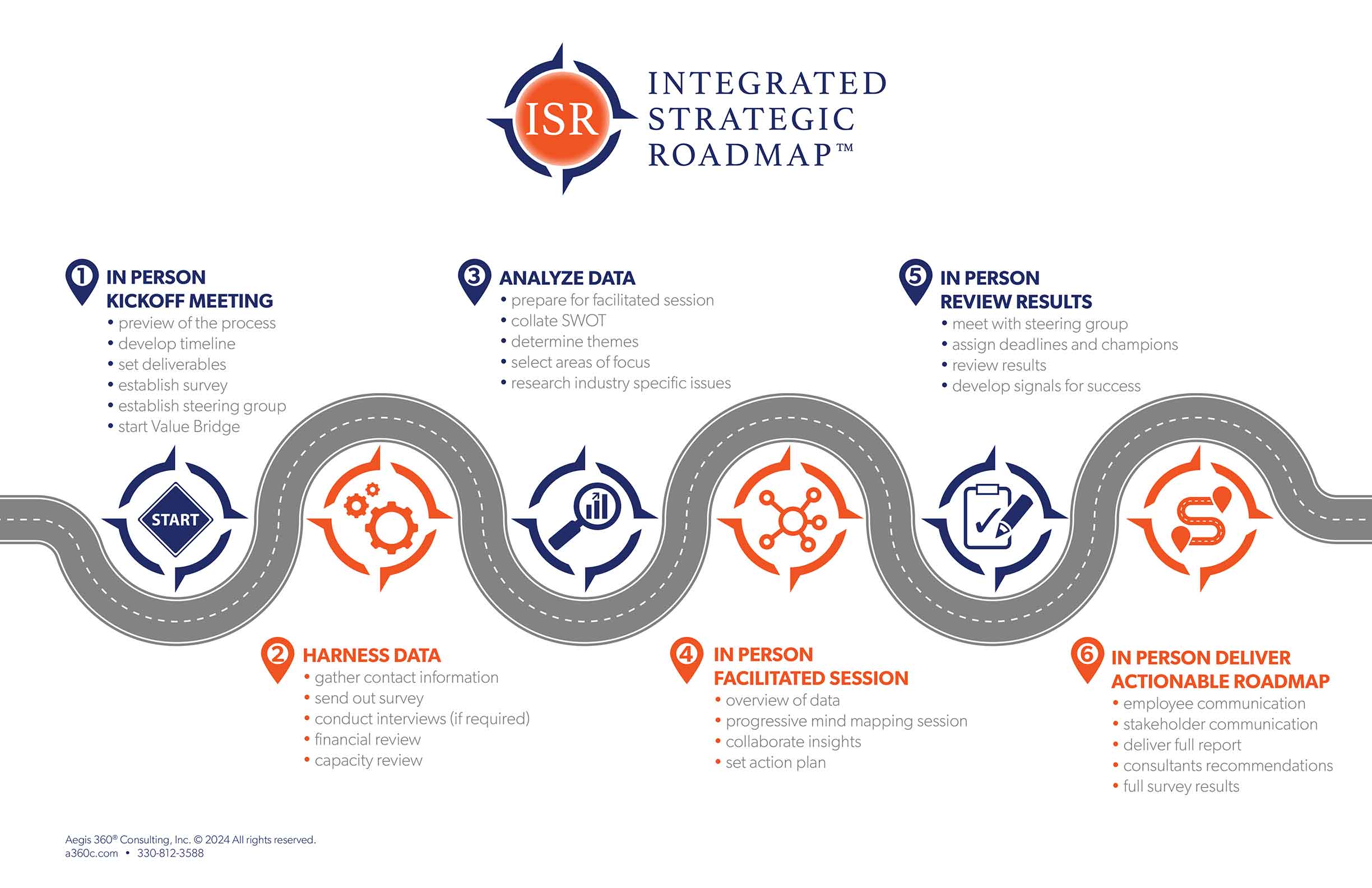
As a business leader, you likely know two things for certain at any given time. You know where you currently are in relation to your marketplace, your competitors, and, most importantly, your past progress. You’re also likely well aware of what you’d like to achieve one, five, or even ten years later.
Strategic planning is all about connecting those two points as efficiently and productively as possible.
Table of Contents
-
- An Opportunity to Go Beyond the Basics
- A True Alignment of Vision and Efforts
- Unlocking Informed Decision-Making
- Carving Out Competitive Advantage
- Superior Ability to Change
- The Path to Long-Term Success and Sustainability
- Aegis 360: Your Partner in Strategic Planning
- An Opportunity to Go Beyond the Basics
Strategic planning helps you make better and more informed choices every day, regardless of what is happening in the industry around you. It helps you identify and capitalize on any competitive advantage you have. It makes you adaptable to change and helps put you on a path to sustainable success over the long term.
But in a larger sense, the actual mechanics of the “plan” itself are just a small part of why strategic planning is critical for organizations. Read on to find out more, and contact the team at Aegis 360 for a consultation to help develop or refine your strategic plan.
An Opportunity to Go Beyond the Basics
We’ve written in the past about exactly what a strategic plan is and what it can help accomplish for your business. On the surface, it seems like a straightforward exercise—you’re defining your vision for the future, which allows you to identify your strategic goals and objectives. This, in turn, inspires you to take the exact steps you need to take to make that vision a reality.
Think about it a bit, like going on a cross-country road trip. Even if you knew exactly where you wanted to end up, you’d never get in the car and just hope for the best. You’d use a map to plan your route meticulously, highlighting which cities you need to pass through to reach your ultimate destination.
A strategic plan is the business equivalent of that road map.
A True Alignment of Vision and Efforts
One of the most immediate strategic planning benefits is that it helps align your company’s vision with its operational efforts. It’s an opportunity to ensure that everyone is working towards a common goal day after day. If people don’t understand the endgame, they may be productive, but they’re not focusing that hard work, energy, and passion on the things that help you reach your goal.
To that end, strategic planning can be a great way to quickly identify what will and won’t work to help you achieve those business goals. Identifying redundant efforts, in particular, crystallizes the right way, allowing you to eliminate what isn’t working while streamlining your operations.
Unlocking Informed Decision-Making
Any seasoned business professional will tell you that gut instinct and “intuition” will only get you so far. To make the best decisions possible, you need as much accurate, actionable data as possible to guide you.
The nature of strategic planning demands that you analyze virtually everything about your business actions and compare those results with your objectives, thus driving more informed decision-making across the board.

Take resource allocation, for example. Embracing strategic planning will help you identify your business’s strengths and weaknesses. By default, you will analyze your business processes to the point where inefficiencies rise to the top, providing the insight you need to streamline your workflows. Once you allocate your resources efficiently, you will be closer to reaching your long-term objectives. But in the short term, strategic planning will also save you time, labor, and mission-critical funds.
Carving Out a Competitive Advantage
Business strategic planning also helps to position your business by identifying where it excels in the marketplace over your competition and capitalizing on those advantages as quickly as possible.
You can only produce a viable strategic plan by first analyzing your strengths and weaknesses. With that insight comes clarity—you get a better sense of new opportunities you may not have been aware of or external threats you might have missed. This knowledge helps you zero in on those unique qualities and traits that make you outperform your competitors.
Superior Adaptability to Change
Another clear indicator of the importance of using strategic planning in your business relates directly to the ever-changing world around us. It doesn’t matter what type of business you’re running or even which industry you’re operating in—consumer behaviors, market trends, and even the global economy can change significantly without warning. The events of the last several years have taught us that even the strongest of businesses need to be able to adapt to often unpredictable (and sometimes outright unthinkable) challenges.
A strategic business plan will help you always be prepared for the unexpected. Remember that this process involves establishing clear, measurable goals from the beginning. You will break a larger objective down into a series of smaller, more manageable steps. These smaller targets allow you to track your progress in real time. If something suddenly isn’t working, you’ll know about it immediately. If you are working without a plan, you end up in a “hit or miss” situation where your business may succeed or fail without you being aware of what caused your outcome.
Having a solid strategic plan in place also means that if the market suddenly changes or new trends emerge that impact what you’re doing, you’ll know about it faster than you would when working without a plan. More importantly, you will understand how those market changes and disruptions impact your current business actions, allowing you to pivot as needed. You may even find that your priorities need to change. The point is that you’ll know; once you have that knowledge, you can act appropriately.
The Path to Long-Term Success and Sustainability
The most essential benefit of strategic planning is how it contributes to business sustainability.
Research indicates that for some businesses, growing too quickly is just as bad as not growing at all. Scaling too quickly isn’t sustainable because it often stretches your resources too thin. You may enjoy your current short-term growth, but in the long run, you almost always lose because resources like your people, products, services, and cash flow will begin to suffer.
Again, when preparing a strategic plan, you’re breaking your long-term vision into more easily manageable chunks. That’s why it’s important to pay attention to how you set goals. Do not simply set goals for the sake of setting goals; set measurable goals. Measurable goals allow you to monitor your key performance indicators and show you what is working and what might not be playing out the way you thought. You can see where your resources are being stretched too thin, and you understand why. Without a plan, you don’t have the context needed to understand just how big certain business challenges are and how they impact everything you’re doing.
Once you have a foundational business plan in place, you can ensure that you’re growing in a way that makes sense, given what you’re trying to accomplish. You’re not growing for the sake of it—you’re growing at the rate needed to make that long-term success a reality in a way that can realistically be sustained moving forward.
Aegis 360: Your Partner in Strategic Planning
Since our inception, the team at Aegis 360 has worked to help businesses develop and effectively execute strategic plans. While every business is unique, a few core truths remain the same.
Your team has drive and passion, and your leadership has tangible goals. You need a strategic road map that can align these integral elements, taking you from where you currently are to where you hope to be. We do that by leveraging the power of our expertise to your advantage, along with harnessing data, mind mapping, collaborative insights, and more.
What you’re left with are powerful, actionable, integrated strategy maps custom-built with your business and its needs in mind—precisely how they should be.
To find out more about why strategic planning is so essential to your long-term success or to get answers to any other important questions you might have, please don’t hesitate to contact Aegis 360 today. You can also schedule a consultation to help develop a new strategic plan or refine an existing one to get the results you’re after in the most effective way possible.

